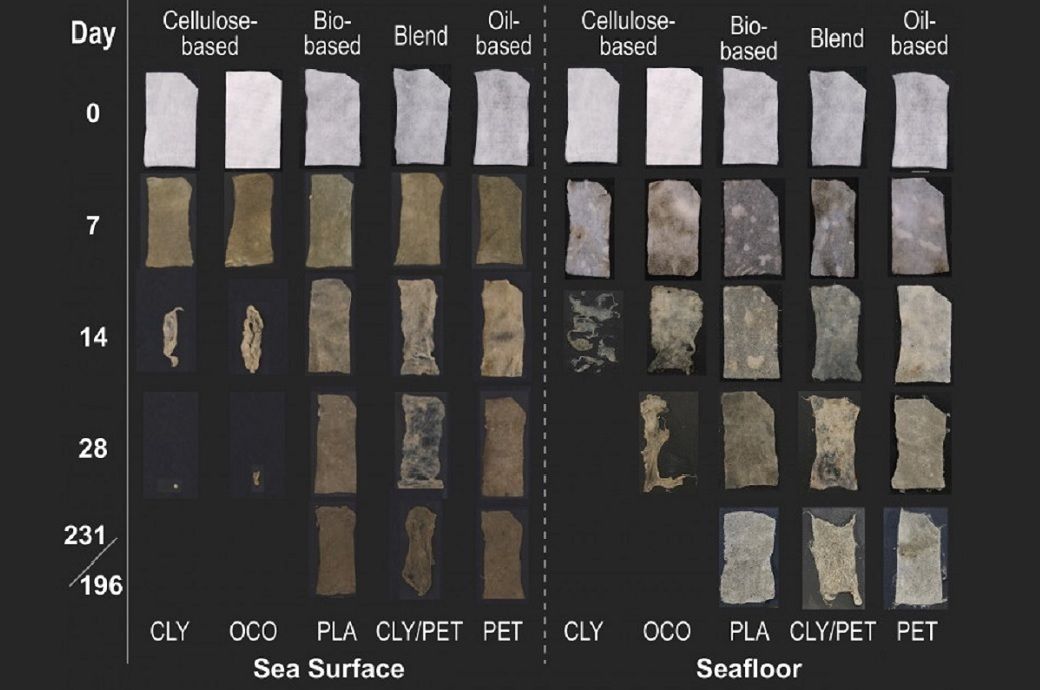US study finds PLA & oil-based fabrics resist degradation

Insights
- A study has revealed that while natural and wood-based cellulose fabrics degraded within a month in the ocean, PLA and oil-based portions of fabric blends did not degrade even after a year.
- PLA, a bio-based plastic, is viewed as an eco-friendly alternative to plastic.
- The research suggests that materials deemed biodegradable might lead to marine pollution.
Biodegradable and compostable PLA, a bio-based plastic made from renewable resources like corn starch or sugar cane, is often hailed as a solution to the plastic problem and was therefore chosen for the study. Ten different types of commonly used fabrics in the textile industry were tested, including natural cellulose, wood-based cellulose, bio-based plastic (PLA), oil-based plastic, and mixed fabric blends, according to the study titled ‘Not so biodegradable: Polylactic acid and cellulose/plastic blend textiles lack fast biodegradation in marine waters’ published in the PLOS One journal.
These textile samples were placed in containers in the sea and observed every seven days. High-resolution scans and spectroscopy were used for in-depth examination. The procedure continued until 231 days at the ocean’s surface and 196 days at the seabed. The samples were then transferred to Scripps Oceanography’s Experimental Aquarium, where natural and cellulose-based textiles disintegrated within 30-35 days, but oil-based and bio-based materials showed no sign of degradation even after 428 days.
The study also highlighted that the oil-based portion of fabric blends, often marketed as a sustainable alternative, remained intact despite the natural fibres degrading. Independently, the same fabric types were tested in a bioreactor, simulating a marine environment, where cellulose-based materials completely biodegraded within 28 days, but oil-based and bio-based fibres showed no degradation.
The study calls for further exploration into how these materials behave in natural environments, as bio-based PLA plastic and oil-based materials, like polyethylene terephthalate and polypropylene, are a significant source of pollution, according to the article, authored by Lauren Fimbres Wood, which was published on the UC San Diego website.
Sarah-Jeanne Royer, who performed the research while a postdoctoral scholar in the Dimitri Deheyn laboratory at Scripps Oceanography, said: “This study shows the need for standardising tests to see if materials promoted as compostable or biodegradable actually do biodegrade in a natural environment. What might biodegrade in an industrial setting does not necessarily biodegrade in the natural environment and can end up as marine and environmental pollutants.
“The natural, cellulose-based materials would disintegrate in about one month, so we would exchange for a new sample after the old one disintegrated. The natural, cellulose-based samples were replicated five times, while the other materials remained the same for more than a year.”
The research, which was conducted by Royer, Francesco Greco, Michaela Kogler, and Dimitri D Deheyn, was funded by various sources, including the Biomimicry for Emerging Science and Technology Initiative and the Walter Munk Foundation for the Oceans.
Fibre2Fashion News Desk (NB)
































-Ltd..jpg?tr=w-120,h-60,c-at_max,cm-pad_resize,bg-ffffff)





.jpg?tr=w-120,h-60,c-at_max,cm-pad_resize,bg-ffffff)
.jpg?tr=w-120,h-60,c-at_max,cm-pad_resize,bg-ffffff)






